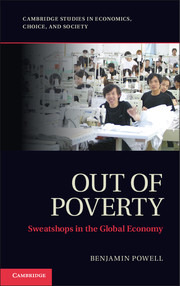Book contents
- Frontmatter
- Contents
- Figures
- Tables
- Acknowledgments
- Preface
- 1 Introduction
- 2 The Anti-Sweatshop Movement
- 3 The Economics of Sweatshop Wage Determination
- 4 Don’t Cry for Me, Kathie Lee
- 5 Health, Safety, and Working Conditions Laws
- 6 Save the Children?
- 7 Is It Ethical to Buy Sweatshop Products?
- 8 A History of Sweatshops, 1780–2010
- 9 The Process of Economic Development
- 10 What Good Can Activists Do?
- 11 Conclusion
- References
- About the Author
- Index
- References
2 - The Anti-Sweatshop Movement
Published online by Cambridge University Press: 05 June 2014
- Frontmatter
- Contents
- Figures
- Tables
- Acknowledgments
- Preface
- 1 Introduction
- 2 The Anti-Sweatshop Movement
- 3 The Economics of Sweatshop Wage Determination
- 4 Don’t Cry for Me, Kathie Lee
- 5 Health, Safety, and Working Conditions Laws
- 6 Save the Children?
- 7 Is It Ethical to Buy Sweatshop Products?
- 8 A History of Sweatshops, 1780–2010
- 9 The Process of Economic Development
- 10 What Good Can Activists Do?
- 11 Conclusion
- References
- About the Author
- Index
- References
Summary
The modern anti-sweatshop movement began developing in the early 1990s, but much of the activity was limited to isolated protests and individual actions. In the latter half of the 1990s, the movement developed many interrelated organizations that waged sustained campaigns against sweatshops. Most of those organizations continue their anti-sweatshop activism today. The movement contains a mix of celebrities, politicians, unions, student activists, and scholars. Some affiliate with major anti-sweatshop organizations, whereas others speak out or protest on their own.
There are significant differences between the different organizations within the anti-sweatshop movement in terms of both the changes for which they advocate and how they pursue their advocacy. However, all of the major anti-sweatshop organizations have this in common: They all believe that free-market competition in the global economy is not, at least alone, the best way to improve the lives of sweatshop workers. The groups vary in their opinion of exactly how the process of free market competition should be altered to improve the lives of workers. Some advocate consumer activism through either boycotts or “shop with a conscience” programs. Other groups want legal mandates created and enforced that dictate living wages, health and safety standards, and working-hour regulations. Some groups favor trade restrictions on countries that do not mandate and enforce these labor standards. Some groups concern themselves only with child labor, whereas others focus mostly on the freedom to unionize.
- Type
- Chapter
- Information
- Out of PovertySweatshops in the Global Economy, pp. 8 - 22Publisher: Cambridge University PressPrint publication year: 2014



